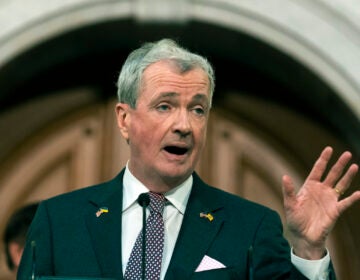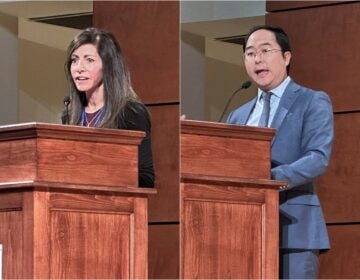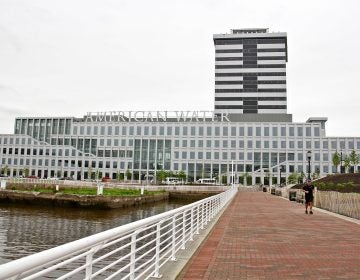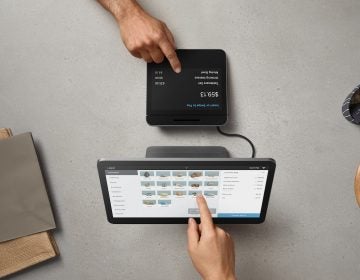Businesses give thumbs down to N.J. governor’s proposed transit fee
A top Jersey economist says the governor’s corporate transit fee proposal could hurt the state’s business climate. Business groups agree.
Listen 1:17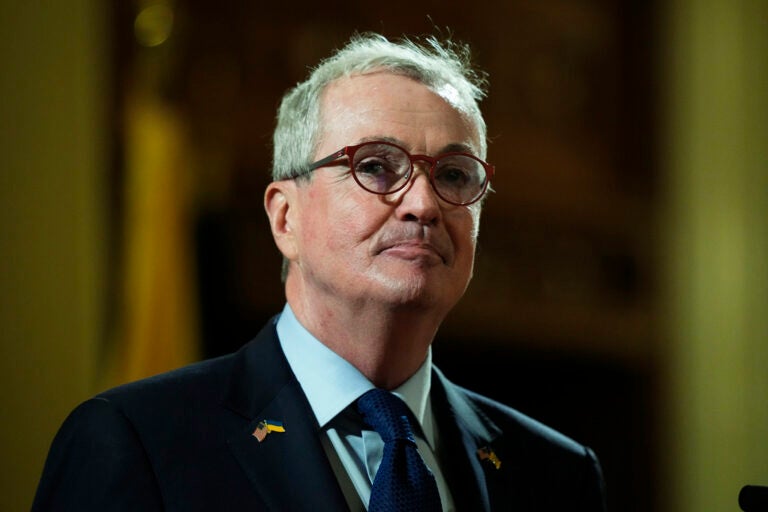
File photo: New Jersey Gov. Phil Murphy delivers his State of the State address to a joint session of the Legislature at the statehouse, in Trenton, N.J., Tuesday, Jan. 9, 2024. New Jersey's Democrat-led state government is pushing to enact legislation to eliminate out-of-pocket costs for abortion. Murphy called for the legislation to pass before the summer. (AP Photo/Matt Rourke, File)
From Camden and Cherry Hill to Trenton and the Jersey Shore, what about life in New Jersey do you want WHYY News to cover? Let us know.
When Gov. Phil Murphy unveiled his state budget earlier this week, he proposed a “corporate transit fee” for the state’s 600 most profitable corporations. The tax would raise close to $900 million annually to subsidize New Jersey Transit.
“The governor did a 360 about-face, and again, it’s not just a promise is a promise, businesses must rely on the word of their policymaker because they make investments based on that,” said Michelle Siekerka, president and CEO of the New Jersey Business and Industry Association.
Last year, Murphy announced the CBT would sunset, acknowledging it was bad for the business climate, Siekerka said. When the CBT ended Dec. 31, businesses made plans and spent money assuming their tax would be 9% instead of 11.5%, he said.
“Then you do a 360, you renege and you pull the carpet out retroactive to Jan. 1, going back and recapturing what these businesses thought was already off the table,” Siekerka said. “It’s not bad policy, it’s terrible policy.”
The business community may have allies among lawmakers on both sides of the aisle in their apprehension. Assembly Speaker Craig Coughlin, who will play a key role in the budget negotiations, expressed concern about the governor’s tax plan.
“I remain convinced that any discussion about increasing corporate taxes must be had with our state’s long-term fiscal health and a further commitment to reducing property taxes in mind,” Coughlin said in a release.
James Hughes, Dean Emeritus of the Edward J. Bloustein School of Planning and Public Policy at Rutgers University, said Murphy’s actions could influence how companies view New Jersey.
“It’s going to impact expansion plans or potential moves to New Jersey because it’s a very, very competitive national environment that we have to deal with,” he said.
Hughes noted that if the new tax is approved by the legislature, New Jersey would solidify its reputation as having the highest corporate business tax in the nation.
“It was a major disappointment, it was a surprise, and now it makes our job harder,” said Tom Bracken, the president and CEO of the New Jersey Chamber of Commerce.
Hughes said he recognizes that New Jersey has the largest mass transit system in the nation and funds are needed to keep it going because ridership levels have not come back to pre-pandemic levels.
“The debate would be, ‘Do we use some of the (federal COVID-19) surplus to cover that? Do we maybe lessen contributions to the state pension plan?’ Those are the kinds of debates that can take place,” he said. “You have to look at this in a broader framework, looking also at expenditure levels.”
Not everyone is condemning the transit fee.
Alex Ambrose, a policy analyst with New Jersey Policy Perspective, said the governor’s proposal would finally provide stable, dedicated funding to the agency while setting a strong foundation to protect NJ Transit now and in the future.
“This is exactly the type of thinking needed to get NJ Transit back on track and it’s long past time that big corporations pay for the infrastructure that helps them generate their record-breaking profits,” she said.
Ed Potosnak, who heads up the New Jersey League of Conservation Voters, agreed.
“More must still be done to head off an unwise proposed fare increase that threatens to drive cars back onto the roads and increase congestion even as the agency is trying to recover from the impact of the COVID-19 pandemic,” Potosnak said.
Ben Dworkin, director of the Institute for Public Policy and Citizenship at Rowan University, said it is too early to know if the tax will actually go into effect.
“When the governor proposes a budget in February, the final budget will not be agreed upon until the very end of June,” he said. “There is going to be a lot of negotiation directly between the governor and the legislature, side conversations with the business community, so we’re at the very beginning of a long dance.”

Get daily updates from WHYY News!
WHYY is your source for fact-based, in-depth journalism and information. As a nonprofit organization, we rely on financial support from readers like you. Please give today.



